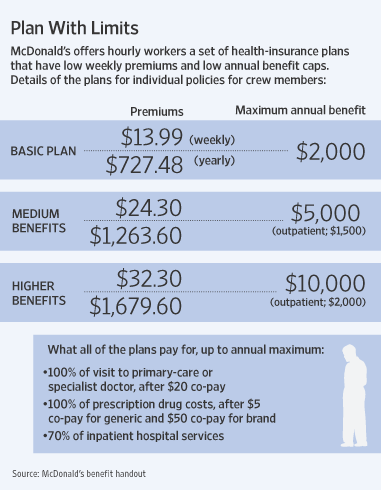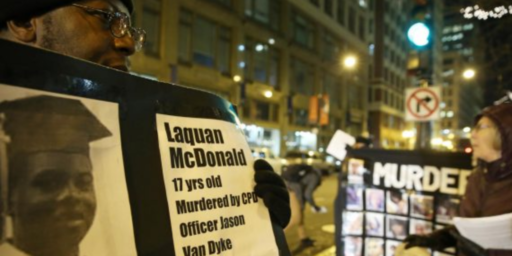McDonald’s Health Plan ObamaCare Casualty? Good!
Among the unintended but not unforeseen consequences of the new health care law is that companies who were previously offering some health coverage may stop altogether. In some cases, that's just as well.
Among the unintended but not unforeseen consequences of the new health care law is that companies who were previously offering some health coverage may stop altogether. WSJ reports that McDonald’s may do just that.
McDonald’s Corp. has warned federal regulators that it could drop its health insurance plan for nearly 30,000 hourly restaurant workers unless regulators waive a new requirement of the U.S. health overhaul. The move is one of the clearest indications that new rules may disrupt workers’ health plans as the law ripples through the real world.
[…]
While many restaurants don’t offer health coverage, McDonald’s provides mini-med plans for workers at 10,500 U.S. locations, most of them franchised. A single worker can pay $14 a week for a plan that caps annual benefits at $2,000, or about $32 a week to get coverage up to $10,000 a year.
Last week, a senior McDonald’s official informed the Department of Health and Human Services that the restaurant chain’s insurer won’t meet a 2011 requirement to spend at least 80% to 85% of its premium revenue on medical care.
McDonald’s and trade groups say the percentage, called a medical loss ratio, is unrealistic for mini-med plans because of high administrative costs owing to frequent worker turnover, combined with relatively low spending on claims.
Democrats who drafted the health law wanted the requirement to prevent insurers from spending too much on executive salaries, marketing and other costs that they said don’t directly help patients.
[…]
A spokeswoman for McDonald’s said it would look for other insurance options if it couldn’t get the waiver. The company’s chief people officer for the U.S., Steve Russell, said, “McDonald’s will continue to be committed to providing competitive pay and benefits.” The chain has offered a limited benefits plan for more than 10 years. The current version provides outpatient, inpatient, preventive-care and prescription-drug coverage. McDonald’s says 85% of participants have less than $5,000 in medical expenses a year.
Regulators haven’t yet had time to flesh out the details on how the law will be implemented. It’s quite possible that a waiver will be granted for these kinds of plans as they work through the painful process of implementing the law. It’s just a natural result of trying to craft a one-size-fits-all solution for a very diverse economy.
UPDATE: I didn’t notice it initially but both Teresa Kopec and E.D. Kain make a good point: A plan that costs $728.48 for a maximum benefit of $2000 is horrendous. Indeed, Kain notes, these people would indeed be better off if McDonald’s canceled their plan and just dumped them into the new ObamaCare fallback plan.
A $10,000 maximum benefit provides no real health insurance at all, though it’s better than nothing. We really should have fought for universal catastrophic insurance starting immediately, which would have taken the teeth out of reports like this one. And if I were a McDonald’s employee, I’d be hoping against hope that I could lose the crappy mini-med plans and get onto an exchange as quickly as possible. Though hopefully not before 2014….
Granting that it’s insurance and that an employee could find themselves hospitalized and getting the $2000 benefit after the first weekly payment of $13.99 — at which point it would be a bargain! — this is just the opposite of the kind of insurance typical low wage McDonald’s employees — who I’d assume are mostly teens and twenty-somethings — needs. They’d be much better off with a policy that didn’t cover ordinary expenses but kicked in at, say, $5,000. Still lousy, of course, if you’re making poverty wages.
The bottom line, though, is that it’s absurd to expect companies who hire mostly low skill, high turnover workers to provide health insurance. We’d be better off with some sort of single payer system with a parallel Cadillac system for high earners.








” It’s just a natural result of trying to craft a one-size-fits-all solution for
a very diverse economy.”
Are you kidding Jim? The very last thing the new healthcare bill is, is a “one size fits all.” That’s why it’s over 2000 pages long. And as even you admit there’s probably going to be a waiver during implementation. There are very few “one shoe fits all” pieces of legislation in the US and even with new laws that start off as relatively straightforward (I emphasize relatively) it isn’t long before various interest groups have overlaid them with forests of mods.
It is incredible how the media is spinning this. McDonalds [may] cancel its policies, and Obama gets the blame.
McDonalds is simply trying to make as much money as it can. Nothing wrong there -thats the American way. They offer a pretty lousy health care plan and they don’t want to offer something a little bit better, so they threaten to cancel completely. And maybe they will – its no skin of their back. But it is entirely their decision, and their responsibility.
Another way of looking at the same data: McDonald’s presently offers a health care plan far above what others in the industry offer. The government is demanding that they offer one far better and McDonald’s is asking for an exemption to allow them to merely keep delivering an industry best plan.
Outside management, fast food jobs are low skill, high turnover jobs. In years past, they were mostly held by students looking for some extra spending money. It’s unreasonable to expect that they’d come with grown up benefits.
At the end of the day, our business financed system just doesn’t make sense, for a whole variety of reasons. We’d be better off with some sort of baseline single payer system with the ability for those who can afford it to supplement their coverage.
Wouldn’t this be a positive side effect considering the problems associated with health insurance being tied to business?
So James, you support the French system then…
Now can get you get four Republican votes for that….
Certainly can’t get mine…
I’m not sure you can get more than 2/3 of Congressional Democrats for that. I don’t like the idea but think it’s better than most of the alternatives. We just don’t have anything like a free market in health care at this point, so we’ve many of the worst features of the market (high costs, imperfect coverage) and a government system (high regulation, high bureaucracy) right now.
“The bottom line, though, is that it’s absurd to expect companies who hire mostly low skill, high turnover workers to provide health insurance.”
I don’t know if that’s the conclusion I’d come to. McDonald’s, it seems, would be one of the company’s likely to benefit from the “26 and under” provision. Who knows how many people that will affect, but for the ones it does, McDonald’s costs go from $X to $0.
If administrative costs are the hinge, why not seek to lower them? Canceling the plan outright seems a bit drastic. Indeed it seems like exactly the kind of decision that made “health care reform” such a hot topic. I mean, if companies weren’t so set on screwing over their workforce to save a few bucks, maybe we wouldn’t need the big bad government to come in and start dictating terms, no?
James, I just don’t see how a pure free market approach can ever work in health care. There are certain things un-restrained capitalism simply does not work for, and I believe this is one of them. Other examples: communal renewable resources, such as fishing, wherein one person can get rich by taking everything at once but completely depleting the resource in the process; necessary policies with very long term (10+ years) horizons; mitigation of potential hazards with very low probability but catastrophic results.
It’s conceivable that a free market plus public safety net approach could work. The problem with the current system is that so few people actually pay for their own care that the incentives are out of whack. A doctor’s visit costs me $10. I think it cost us $100 or so in medical expenses from gestation through post-op recovery for a fairly complicated pregnancy, hospital stay, C-section, and infection care. That’s great, of course, if you’ve got great insurance. But some poor schmuck trying to pay out of pocket gets horrendous bills because costs are subsidized in that manner.
Doctors would make a nice living but they wouldn’t be millionaires under a user pays model.
It would appear the report in the WSJ was baloney. Micky D’s have denied it.
http://finance.yahoo.com/news/McDonalds-denies-report-of-apf-455701319.html?x=0PD
UPDATE
“We’d be better off with some sort of single payer system with a parallel Cadillac system for high earners.”
Now that would essentially be a one size fits all program.
“But some poor schmuck trying to pay out of pocket gets horrendous bills because costs are subsidized in that manner.”
Too true. The bills if you have no insurance and are paying full tariff are unbelievable. A young guy who takes care of all the fences on my property (I have a taste for Jeffersonian woodwork) broke his leg badly two years ago (fortunately not while working for me since he’s not bonded) and the bills for surgery and hospitalisation amounted to nearly $70,000 which he never has any hope of paying. I suggested he consider enlistment in the French Foreign Legion.
James Joyner says:
“It’s conceivable that a free market plus public safety net approach could work.”
I agree. Of course, the devil is in the details.
Too true. The bills if you have no insurance and are paying full tariff are unbelievable.
This varies, actually. Emergency rooms are notoriously expensive for the uninsured (in part because they have to cover the gaps left by those who can’t pay), but if you offer to pay up front and they don’t have to bill the insurance company, you can actually get some pretty good deals on non-urgent care. Even with (non-emergency) surgery, depending on the circumstances.
This doesn’t change the main point, but thought I would mention this because a lot of people don’t realize that doctors and hospitals love people that spare them from having to deal with insurance companies and will often work with you on that.
“I agree. Of course, the devil is in the details.”
Well if it’s so easy why have the Republicans never been able to produce a coherent plan as an alternative? Could it be because a purely private sector approach is not viable? Having a baby costs around $20,000 when the median income in the country is around $46,000. Treatment for more serious but very common conditions like cancer surgery, heart by passes, etc can cost hundreds of thousands. Then of course most of health expenditure occurs in the last 20 years of life when people are on fixed incomes. Thus some form of insurance system is absolutely inescapable. Jim’s user pays is a pipe dream. So once it’s recognized that we have to have an insurance based system it then becomes a debate about who runs it (the govt or private sector), how it’s paid for, and what is a fair market price for the range of treatment goods and services provided by the health “industry” who consume 70-80% of our roughly $2.1 trillion in health expenditures. What we have is a massive patchwork quilt that is inefficient and costs twice as much as anyone else’s system. Despite all the hyperbole HCR is a fairly modest measure which utilises the present system to provide universal care and get some more rationalisation into how it works which may or may not save a bit of money. The private insurance market is inefficient and offers an opportunity for some savings but the mother load of savings is going to have to come the delivery end which means less profit for big pharma, hospitals, and doctors, and some limits on how much we’re going to spend on keeping grandma alive for another six months.
“you can actually get some pretty good deals on non-urgent care.”
The problem is you don’t usually go to an emergency room because you need non urgent care. If you’re taken to an emergency room with a serious injury or condition and have no insurance (which by definition means you have slender means) is it realistic to see deals being negotiated? I don’t say it never happens but in the vast majority of cases people are treated because they have to be and the hospital tries to recover the money. Hence my suggestion of the FFL for my young friend.
My question is: If a consequence was easily foreseeable and you take the action anyway, don’t you lose the right to call the consequence “unintended”?
Brummagem Joe says:
“Well if it’s so easy why have the Republicans never been able to produce a coherent plan as an alternative?”
Who said it was easy. I agreed with James that it could work. No one said it was easy or even possible to put it in place.
As for why the Republicans haven’t done it yet, my guess is because it simply is outside their demographic. Only a small percentage of their donations come from people who really want reform. No, I don’t know this for a fact. As I said, it’s a guess.
> McDonald’s presently offers a health care plan far above what others in the industry offer.
That is simply not true. I was in the restaurant business for a long time. I worked at places that offered decent health care. Typically they were owned by people who actually knew the folks who worked for them a gave a crap about their well being.
@anjin-san: McDonald’s is in the fast food business, not the restaurant business. They’re completely different operating models.
Moreover, ED Kain (via Sully),
James even in the fast food industry MCdonald’s insurance is complete crap..
Both part of the food service industry James, different operating model or no James. I would also like to see evidence that the macdonalds plan is “far above” what other major fast food chains offer.